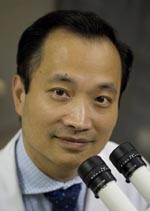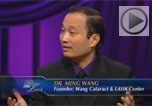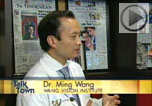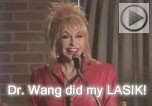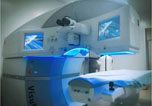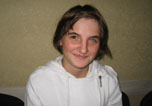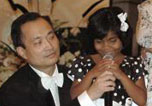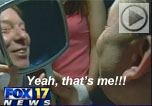- Over 55,000 LASIK and cataract procedures (including on over 4,000 doctors)
- The FIRST center in TN to offer Laser Cataract Surgery
- Introduced bladeless all-laser LASIK to the state
- Implanted the state's first FOREVER YOUNG™ Lens
- The first surgeons in the US to perform a new Intacs surgery to treat keratoconus
- Helped patients from 40 states and 55 countries
- International referral center for cataract surgery and LASIK complications
- Read Dr. Wang's book: LASIK Vision Correction
Why did you decide to have LASIK? Why did you choose Dr. Wang? How has your life changed since your LASIK procedure?
What is your advice for people considering LASIK?
Click to read more
| Article Library | Print This Page |
Poetry and medicine
An interview by Richard Nelson with Dr. Ming Wang
Richard Nelson: I’m here with Dr. Ming Wang in downtown Nashville on this Saturday morning, August 13th, 2011. Dr. Wang, as we’ve been talking with your background in China, the research question of my dissertation is what impact does contemporary poetry from 1950 to the present have on society. This is a question that is particularly apropos to America, yes, but I’m so interested in your perspective coming from China and being here for a long time now, since ’86, I think? If you, perhaps, could share some of your own background from the angle of what impact you saw of poetry in China growing up, if that affected people in general, if it affected the politic of the country. My arbitrary time of 1950 is quite close to 1949 when there was a big political change. Please feel free to share if there’s anything about poetry, if it was that influence of politic or the politics after that were changed, how it might have affected you, and maybe it didn’t, but if it did, if you’ve written any—not that you need to, but anything you feel relevant about the arts, music, what you’ve done that might shed light on the impact that contemporary poetry has if you are up on China, of course, or America. Whatever you feel to share is fine.
Dr. Ming Wang: Ok. Thank you, Richard. In thinking about your question in terms of the impact of poetry to modern China, modern China pretty much, as you said, started with the establishment of the People’s Republic in 1949. I was born in 1960 and so from that point on I pretty much grew up in this Communistic country at the heart of a period that has gone through rather significant changes. In thinking about your question in terms of poetry, number one: poetry to me is a description of feelings of people going through life but it’s a lot more than just a description. It’s an elevation into—it’s not just describing what happened in life, but also elevates into a conceptual height that reveals some insight about life. So to me, what poetry means is it’s a product of humans’ inner heart, inner mind as a reflection of experience of life. For example, one can just write a story about something happening in life, you call that a report, you call that a descriptive article about something that happened in society, to me that is not poetry. Poetry means not only describing what happened but that taking to one’s mind and heart and digest it and reflect what it means into a more conceptual high, an intellectual high, a more emotional response to what happened in the world. To me, that’s what poetry is about even though I’m not a professional poet. I see poetry as an emotional inner response to events; things in the world by human beings. So, in that extent I can cite several examples of poetry as I so generally define in the broader sense. For example, I grew up in the period called the ten-year catastrophe. The poetry that reflected the people’s life and spirit during that time, which was from 1966 to 1976, were these songs that the Communist government forced people to learn, to sing, to dance. I remember as a kid, “Study every day and looking up and improve every day.” So it was an era of socialism/ communism that the government basically brainwashed all of the children and the students with teaching the doctrines of Marxism and Communism being the only way to life. It was a period of time in which there was what I call now the ten-year catastrophe during this ten year period of 1966 to 1976, but it’s more like a cultural holocaust. It was taking away the thousand years of culture and replacing it with Communist doctrine in those songs as I said. I can reflect—there was a time of conflict between those governmentally enforced programs of Communist ideology and the traditional Chinese history; cultural background, which people had been so engrained to for thousands of years. I remember in my hometown, Hangzhou, south of Shanghai, there is a lake called West Lake. There are parks around West Lake and as a kid I used to walk around this lake. I remember this one Pagoda Temple and there are two lines of poetry on each side of the pole. It says, “Mountain, water; sometimes that things will surprise you. Cloud and raining; sometimes it will arouse your curiosity.” Chinese culture’s very rich. For poetry, I can cite you one of the famous poems by a poet called the Bai Li. He lived in the Tang Dynasty about 1300-1400 years ago. The Tang Dynasty in China’s history is almost like the Elizabethan Period in England. I think maybe it was 600-900 AD or something like that. It was like the England Elizabethan Period, a cultural height with encouraged innovation and creativity. As an example of that kind of creativity and cultural development and the arts during the Tang Dynasty, that’s represented by Mr. Bai Li. Li is the last name. He wrote many poems. I will just cite two. One poem is called, Holding up a cup, inviting the moon. I will translate right on the spot. It’s not an accurate translation. It says, “Among the flowers there’s a bottle of wine. I’m drinking all by myself with no companion. Oh, I can invite the moon. The moon, myself and my shadow; we all can drink together. When I sing, the moon hangs around and does not want to leave. When I dance, my shadow closely follows me. The moon cannot really hear my singing, and the shadow that dances around me doesn’t mean much, but you know, life is about capturing the moment; capturing the happy times in our lives…” It continues, but this is the beginning part of the poem that is called, Holding the cup and inviting the moon. Reflect on a poet in a beautiful setting and try to imagine him interacting with the moon and his shadow. The main point is even if you’re by yourself you can still enjoy life; life is about capturing the moment. Mr. Bai Li wrote another poem describing a natural scene in the middle of China called Three Gorges where, in fact, in the last decade it was a very famous river with lots of beautiful scenes on both sides of the river. You can ride a little boat along the side for thousands of miles. That river is now being stopped or banked by the government and they’re trying to make a hydraulic water dam out of it. Mr. Bai Li’s poem describing the scenery of the Three Gorges River, fourteen, thirteen hundred years ago was, “Leaving the Dubai City in the morning among the clouds, I sailed along the river down the stream in the little boat. On both sides of the river I can see the little animals singing and the monkeys dancing among the trees, but time goes so fast because before I realize my little boat has darted down the stream thousands of miles.” This poem is to reflect the natural beauty and to reflect the interaction between man and nature. Coming back to the ten-year catastrophe, it was a conflict and struggle between the traditional Chinese culture, its appreciation of nature, its reflective thinking culture appreciating the spirit of life versus the all powerful indoctrination of the Communist Party during the ten-year catastrophe of 1966-1976. The government started a very forceful deportation program where they figured the best way to keep on dictating is to keep people ignorant; to destroy the traditional Chinese culture. The way to keep people ignorant and to destroy the traditional Chinese culture is to basically stop the educational process of all of the young people. So it started from 1966, the Communist government basically shut sown most of the colleges and started a deportation program and re-educational program for all high school graduates. So if one graduated from high school from 1966-1976, one would not be allowed to go to college. Most of the colleges were shut down. One would be forcefully deported by the government to the poorest part of the country and condemned to a life of poverty and hard labor. If one dared to escape back to the city, one could be jailed or killed. That’s called the ten-year catastrophe which destroyed the future of many, many young people through a ten year period from 1966-1976. It destroyed the lives of twenty million young people. So, I caught that. In the mid 1970s I was fourteen and was graduating from junior high. The government made it very clear that if I would go on to senior high they would deport me like millions of others. Against their wish, my parents (who always emphasized the value of education and learning; they’re both university professors), against this devastating prospect of deportation if I attended senior high, my parents, against their wish and having no choice, took me actually out of school after junior high. So I stopped after a ninth grade education. At the time when most people were looking toward the future for education and learning, my education abruptly stopped. I could not go on to school anymore. I was taken out of school after ninth grade at age fourteen. I lost all hope of studying and of a better life. At that time one of the most common ways that kids were trying to avoid the deportation program was to have a talent that the communist government would find to be useful. Being a musician was one since the Communist government had song and dance troops. So my parents bought me a little Chinese violin Erhu which cost eighty cents, US. This was a little two-stringed instrument with a little sound box covered with snake skin. The bow sits between the two strings. It’s a very flimsy, simple instrument because the bow can only hit one string at any one time. So by definition it cannot produce harmony. It’s only a singular song at any one time. Such a simple instrument when played correctly can produce poetry and produce a dynamic expression of human emotions with this gentle, soulful sound. So I picked up an Erhu at age fourteen and I played really not as an appreciation or love for music but for the sheer need to survive. I remember I was playing fifteen hours a day. There was no heater in our house so I had to play in the cold and my fingers all got frozen up all the time. I had to play fifteen hours a day just to try to make it as a musician into the song and dance troop of the Communist party.
Richard Nelson: There was no heat in your house, so you were on the North side of the river in Shanghai?
Dr. Ming Wang: Hangzhou, south of Shanghai, but winter was so cold.
Richard Nelson: So you were on the South because there was no heat there?
Dr. Ming Wang: Yeah, there was no heat. Actually the whole country at that time—in the sort of south of Shanghai, the southern part of China, there was no heat. In the north they did not have electrical heat either. They only had stoves underneath the beds that burned fire.
Richard Nelson: But you could have it on the north side of the river, not the south?
Dr. Ming Wang: Yes, south of the river you could have it.
Richard Nelson: I was there in ’79 and ’80 and we stayed in a hotel in Shanghai on the south side. I asked where the thermostat for the heater was (with motions, of course because they didn’t speak English. That was the first year that Americans could go). I felt like I was a monkey in a zoo. Everybody stared at me like you do when you go to the zoo. Nobody had a seen a white face for more than thirty years. In the room where I was they had the communists watching from all the hallways. The watcher was in the center so no matter where you came out of a room they saw you right away. I was really quite frightened. I hid my Bible under the mattress and it was really a funny feeling. I was so cold at night so I went down and with motions tried to ask where the thermostat was. The girl came down and I thought she understood. I kept motioning I was cold with hand motions and finally the light bulb came on in her eyes, like, “Oh! I understand now!” She got a little stool and went into the little, tiny closet and shot straight up through a hole in the ceiling. I thought, “My, what a strange place for a thermostat.” After a while she came down out of the ceiling with a little, thin blanket. That was my thermostat [laughing]. We were informed that on the south side there was no heat at all. On the north side you can have something but--.
Dr. Ming Wang: Yeah, and on the northern side the heater was not electrical. It was mostly stove and burning fires. I was playing the Erhu with frozen fingers. There were lots of struggles and very difficult but I picked up the music of blind Ah Bing that I told you about—this music, Two Springs Reflect the Moon, like Bai Li’s poetry describing the river, describing drinking wine among the flowers inviting the moon.
Richard Nelson: That’s another song about the moon. Is that particularly important in Chinese poetry and thought?
Dr. Ming Wang: Yes. I think the Chinese culture is such a reflective culture that the moon offers a favorite subject and object in many poetries because the moon standing away from the earth, looking at earth is a star that is sort of looking down at the earth and reflecting what is going on on the earth. So in that sense the moon is the favorite subject of many Chinese poetries because of being away from the world and reflecting and looking and reflecting what is happening; that kind of setting which is a favorite of Chinese poetry. In Mr. Bing’s music, Two Springs Reflect the Moon is similar. The moon is a bystander looking at the springs and he was imagining how beautiful the night scenes by the pond would have been if he could see. It’s one of the most famous music pieces in China’s history. I was playing the piece and resonating to the sad feelings that were expressed through that music by Mr. Ah Bing. Now I understand why I was resonating at the young age of fourteen/fifteen when I should be happy and joyful, but I was resonating the sad feeling of the elderly poet, musician and composer who wrote this piece. It’s really a wishful piece, so to speak; to wish one could see, wish one could be happy, piece of music. That was resonating because Mr. Ah Bing could not seephysically the beauty of the nature and I could not see mentally in my life and my future as a fourteen/fifteen year old. So, we shared that despair and that “end of the rope” feeling, both him and I. That’s why I played his piece a lot. Then, the government found out that I and many other youths were playing musical instruments only to avoid deportation and they put an end to it. They decided not to recruit and music students from the city where I lived that year. So that put an end to the music learning. Then my parents helped me in the medical school where they were teaching. They were trying to encourage me to study some medicine. I remember asking my father, “Why should I be studying medicine when I have zero change of becoming a doctor?” This government would not allow me to. I remember my father said—and he didn’t mean for it to be poetry, but it is a poetic expression that he told me—he said, “Ming, remember this that knowledge will always be good. Knowledge will always be useful, so study anyway and maybe one day you can use the knowledge.” So I studied medicine illegally being smuggled into medical school by my parents who basically told all their colleagues (the other professors) to keep “hush, hush” and not to report to the government that I was sitting there listening and attending schools. After one year into it the government did discover me and they expelled me. So, I could not study for theknowledge sake. Then I met a young man whose father was executed by the Communist government for having written a play. His father is almost like the Arthur Miller of China. So he was a very famous writer. He wrote this play of an ancient city, an ancient culture rioting against the government. The Chinese government did not like it because they felt it was describing what the current government did—writing against the current government. So they actually killed his father. So the young man at the age of sixteen was very distraught at the end of his life. We met and I was a year or two junior of him. We both did not have jobs; we both were faced with deportation. We both suffered. I suffered from having no chance to go to school and he suffered similarly but also his father was executed by the Communist government. He was a very talented poet. He showed me many poems he wrote. He said, “Ming, what can we do together to try to make a life for ourselves?” I said, “I love music. I played the Erhu before so maybe I can teach myself music composition.” So I did. I taught myself a little bit of background of music composition and I composed music for many, many of his poems. We submitted them to many publications and music magazines. We never got published. Now I’m thinking that we were lucky because many poems that he wrote and I composed the music for really would have been caught by the government and we would have gotten into trouble. Most of these songs and poems were asking for freedom and for opportunity to learn. I will tell you one example that he wrote—remember he was a sixteen year old young man in China in the mid-1970s during the ten-year catastrophe, whose father was killed by the Communist government. The poem that he wrote—I still remember it a little bit today—is called A Prisoner’s Song. The poem goes this way, “At the foot of the mountain, there’s my hometown. There’s no water, no sunshine. People are walking in the town listless, expressionless, without joy and without happiness.” It goes on describing the city, deprived of freedom and joy. Then in a later part of the poem he says, “Let’s break through the handcuffs on our hands and let’s break through the prison, we as prisoners. That’s a fight for freedom.” So that’s called A Prisoner’s Song. I can tell you a little bit about the music theme that I actually composed. This was composed by me by at the age of fifteen or so. I will sing a little bit of the beginning of the song because I still remember a little bit today. So, it goes this way [starts singing] “Do, re, mi, re do re mi, la ti do, ti la mi, mi, mi, mi fa, mi mi, mi, mi fa…..” So far this is the prelude. Then the music I composed to go with the lines is, “La, ti, do, la mi, re, mi, fa, re, mi...” So you can see that there is a touch of melancholy and a poetic and sort of a sad feeling. Now when I think about it it’s remarkable that that music theme was composed by a fifteen year old to go with the melancholy, sad, struggling words in the poetry of a sixteen year old. We never got successful to become a poet for him and a composer for me because we never got our songs published. Then in 1976 the dictator died and there was a chance to go to the university. The college entrance examination was reopened after ten years being stopped. All the students who were deported the previous ten years all wanted to come back to go to college because college was reopened for the first time in ten years. The college entrance examination was two months away. I remember my father said, “Ming, now you should go to school.” I said, “You mean I go back to ninth grade where I stopped?” He said, “No. Go to twelfth grade.” He said that I should study for all three years of high school and take part in the college entrance examination and score among the top one or two percent of the twelfth grade graduating class—do all that in two months. I said to my father, “You’re crazy. I could not do that.” I forgot everything I’ve learned in the last two or three years because I had not been studying in senior high when I should have been. I was playing the Erhu, studying a little bit of medicine and I was composing. So, why shouldn’t I just go back to the ninth grade and start again and three years later try to go to college? I remember what my father said. His answer came from the experience of living in a Communist/Socialist country where there’s no freedom of choice, there’s no predictability of one’s future because any Westerners would not be able to answer my question raised by me at age sixteen to my father about that. Again, my question was, “Why should I kill myself and jump through three years and study the content of high school and to try to score among the top one or two percent of the graduating twelfth grade in order to go to college. Why should I be doing a crazy thing like that rather than to just restart in ninth grade?” Again, my point is that any Westerners today would not be able to answer that question. My father said, “Who is to guarantee the Communist government would not shut down colleges for another ten years next year? The reason that you need to get into college this year is this might be the only chance in your life to get into college?” So, basically he did not trust the government. The government could change their mind next year and all college entry examinations could be taken away again for ten years. That’s why he said I have to go take the college entrance examination, I have to jump over three years, I have to score among the top one or two percent this year and do all the preparation in two months. So he went to many teachers in physics, math, and chemistry and he said, “I will take care of yourself, your family and your medical health if, in exchange, you will tutor my son.” So many teachers came to our house to tutor me and I went to their house. I was drilled for two months, day and night and I slept a few hours a day. The crazy study paid off. I was able to get into college in 1978 and then while in school I wanted to come to America but there was no money. My parents, even though doctors, were making only a few US dollars a month as doctors. They had no money to support me to come to America. But, I heard that an American professor was coming to visit our school in China during my junior year. So I had this little plan of coming to America. The night before the professor’s visit I pulled out an English text book to study so that I could ask him a question. The next day he gave a lecture and he asked if there were any questions and my hand was very high. I asked him the question that I prepared the night before but he did not understand what I was saying. He asked me to explain. I then realized that I had prepared how to ask a question but I never prepared how to listen to an answer. I kept on asking the same question over and over. Finally he realized that my English was really non-existent and that I was trying to impress him with that one single question. The reason he could not understand my question was because I did study English from the English text book the night before alright, but I happened to pull out a British-English text book, not the American one, so the way the question was phrased was not the way that English was used in this country. Anyway, he actually did not disregard my question but he answered it. I did not understand what he was saying but he was impressed nonetheless because I did get to ask my question and he was impressed by my persistence and tenaciousness. So, he helped me. So I borrowed fifty dollars and in 1982 with that fifty dollars borrowed from relatives and friends enough for a one way airplane ticket. I was dropped off at the Washington D.C. National airport with that fifty dollars and with a Chinese/English dictionary. I really knew no one in this vast, new country but it was a big American dream. I studied very hard I realized that opportunity to learn, to attend school—I never realized that I would again have that opportunity as a young man growing up in the ten-year catastrophe. So I appreciate so much the opportunity to study and learn here in this country. Then my dream of wanting to become a doctor got re-ignited and I went to medical school. So today, I sometimes get asked questions of friends who say, “Why are you studying so hard? Why do you work so hard? Why are you driving yourself so hard?” My response has the inner feeling, the reflective, poetic expression of my life’s experience. My response is from the experience of having not. Once one has experienced having nothing, you appreciate so much when you do have it now. So what’s driving me today to work hard is the experience of once having not. While in this country, I studied medicine and I found that science does not offer all of the answers to questions. In fact the more science I’ve studied, the more unknowns I find in the things I studied. I met a pediatric professor who saw the opportunity to influence a young man who was searching for answers to life. He took me out to lunch one time and he said, “What is across the street?” I said, “There’s a car.” He said, “What’s the difference between a car and a human brain?” I said, “The human brain’s much more complex.” He said, “Can the power engine and scrap metals assemble themselves into a car?” I said, “No, there’s no way.” He said, “How about the human brain?” I said, “That would be even unfathomable.” He said, “You got my point.” So through the search for answers to life and being unable to find them completely in science, through the influence of a good Christian professor like him who—I respected his medical knowledge first and then he took advantage of the fact that I respected him medically and gradually guided me into the Spirit of the Lord and faith. So I was not born as a Christian. I became one through searching for the answers to life being unable to find them in science. All these years I studied very hard. I studied physics first and got my doctorate degree, and then I studied medicine in Boston at Harvard. I used to ask myself this question, “Why should I keep on studying?” Because I studied altogether thirty-one years when I finished at age thirty-seven. So I was in elementary school for thirty-one years, but if you’re counting from a freshman in college, I was in school for twenty years. Now I look back on why I was studying both the physics and the medicine and I think the reason is perhaps God wanted to prepare me so that I can better serve my patients today because medicine today is a combination of medicine and high-tech. As a doctor you can truly master the technology, you can trulydeliver the best care to your patients if you’re a doctor willing to spend a substantial amount of time to study the technology part. Most of the doctors study medicine, the traditional part. So if you’re not well-versed in the lasers and physics and optics, you cannot master the high-tech part of the medicine today so you cannot deliver the best care. So I was studying physics first and then I studied medicine. At the time I did not know what the purpose in my life, what my goal was but now I realize; it was God’s way of preparing me to serve my patients better through being able to know both sides of the story; the technology part and the medical part. So, I think it’s a poetic, reflective understanding of God’s role in our lives. That is, at times we do not know what the purpose is, but nonetheless we need to have faith that He does have a purpose for us and we don’t know better because we have not worked hard enough. We need to continue to search and continue to believe that there’s a goal. Eventually, it will become clear to us gradually what he’s planned for each of us later on. For example, I studied research and one of the things I studied in science is when somebody got injured, how do you retrieve the injured eye to prevent blindness? Blindness after injury usually occurs after the body heals and scars. I remember asking my professor, “How can I prevent a human body from scarring?” In the line of research, we discovered that a young person heals much faster. An unborn child heals the best. An unborn child can heal with regeneration without scarring while an adult has to heal with scarring or fibrosis. The reason is in an adult environment if you get cut or injured you have to heal very fast and you pay for the speed of healing to prevent infection and bleeding. That disorganization of the tissue is called scarring. If a baby in the mother’s womb has an injury, there’s no hurry. You can heal layer by layer with regeneration because there’s no chance of infection. It’s a sterile environment. So, a baby can regenerate and has a scarless wound healing process. However, how do you study the scarless wound healing process of a fetus without touching or damaging the fetus? That’s a conflict of science and faith which today is reflected in many areas like stem cells and other things. As a Christian, I believe that God does want us to research. I don’t believe that God does not want us to research to advance the quality of human life, but God wants us to do it in His way. How do you do that? How do you understand a little baby’s wound healing without touching the baby? We discovered this piece of tissue, amniotic membrane surrounding a baby. It is connected to the baby before birth and after birth the amniotic sac is discarded. So we started getting the amniotic membranes donated by mothers after delivering a baby. We took the little membrane, cut it and transplanted it onto an adult’s injured eye to recreate a fetal-like environment in the hope that it will “fool” the body’s adult eye tissue into thinking they have not been born yet so they will regenerate once again just like it did before birth. We transplanted the membrane on the adult injured eye and a few weeks later removed the membrane. Instead of seeing a scarred blind eye, we saw a clear vision eye. We published the world’s first paper demonstrating the transplantation of amnio-membrane to reduce cornea scars and got a United States Patent. But to me, as our laboratory was celebrating the success of science in having found a solution to reduce adult eye injury scarring and blindness through amnio-membrane transplantation, as a Christian I found that I was even more joyful because not only was it a successful effort scientifically, but more importantly, it is really a validation of what I was thinking; that is that God does want us to pursue research. He does want us to advance science to benefit our patients but he wants us to do it in the right way, within the confines of the moral and ethical principles. In this case, He wants us to study fetal wound healing but he does not want us to touch any part of the baby. He wanted us to use the piece of tissue called the amniotic membrane surrounding the baby. It has the same biological property as the baby but it’s not part of the baby; it’s a membrane surrounding the baby. So that’s an example that God always has a plan, one is to study in science and advance but we need to work hard to find those opportunities that He really intended us to take advantage of or path the ways to follow. They can indeed benefit science and mankind and medicine but without stepping out of moral and ethical boundaries as a Christian. Now we have the China Bible project in which I’m very active. I feel that China is growing economically, but with the collapse of the Communist ideology people no longer believe Communism so there’s a spiritual vacuum because people cannot just live on material food, they have to have spiritual food. Ninety-five percent of the Chinese are not Christians. This is indeed an unprecedented, once in a lifetime opportunity for most of us to be involved in a project of such a magnitude that we can all play a part in this big project to possibly recruit for God’s kingdom; one quarter of the human population. Basically this is sort of a long response to you Richard, but in summary, my end points are; number one: Chinese culture itself is full of poetry, and full of poetic reflection of human experiences. To me poetry lies in the heart or the highest realm of achievement of human experiences because it is not just a description of what happens in our lives, but it is the elevation of it; it is the conceptualization of it; it is a reflection of it. So, in that sense, it is the human emotional response to what happens in the world through feelings. So, in that sense, it is one of the highest forms of art. I talked about traditional Chinese art through Mr. Bai Li’s poetry, drinking wine among flowers or riding a boat down the springs in the River of Three Gorges to show that Chinese culture is a reflective and rich culture. But during the ten-year catastrophe, it came into conflict with the Communist doctrines and depravation of freedom. I talked about the ten-year catastrophe and deportation program destroying the future of twenty million youth, how I caught it, struggled against it, learned to play the Erhu not for the love of music but for the sheer need to survive, and then tried to study medicine and tried to also compose music all in an effort to find the opportunity to learn and still to survive. Then, how in Chinese school I was able to luckily meet an American professor who was impressed by my persistence and helped me, how I came to America as a poor student, penniless, but still with an American dream of studying science and how, while studying science, I found myself not being able to find the answers in life through science and was led to Christ by a medical professor who knew my thirst and curiosity for the purpose of life. I found that one can find answers in the larger context through faith in Christianity and then how I apply the principles in a research effort, in this case, trying to understand how to prevent human scarring in the eye through the understanding of fetal wound healing without touching the baby using amnio-membrane tissue successfully in reducing corneal scarring in adults and really to show that God does want us to pursue research and advance science to benefit patients but He wants us to do it in His way; in the right way. So all of these answers reflect overall a type of poetry in life in a sense that we go through life, we meet different challenges, and we need to recognize that just like poetry has ups and downs, happy moments, and sad moments, life itself is like poetry because it has its up and down moments. But wherever we are in life we need to always have this inner peace and feeling that even though we may not understand the purpose of our lives; what’s happening in our lives—I may not understand the purpose of why I should be learning the Erhu or studying medicine without ever being able to become a doctor in China, why I should be composing music, why I should be doing all that, studying technology and medicine for thirty-one years—what is the purpose of all of that? My point is that perhaps that’s ultimate poetry in life; that is we always need to remember that God does have a purpose for us and when we don’t know the purpose of it that’s only because we don’t know better. The point is that we need to be more tenacious and more persistent. We need to continue plugging along because only through doing our homework and doing our best will God, at some point in His choosing, show us His glory and His purpose for our lives. I think God has guided me through life and made me have the desire to work hard and to apply myself continuously very hard today and every day, every moment, because He has allowed me to go through this experience once in my life of having not.
Richard Nelson: Hmmm. Thank you so much. You’ve covered so much and even without asking my ten questions specifically, you’ve covered indirectly nearly everything in such a rich way. You began with just the cultural realization that poetry is such an expression of emotion, the feeling plus the thought from the reflection. In the composition that you had on the Erhu by blind Ah Bing, the word that particularly impressed me there was imagination. That he, in his blindness, imagined and you in your sight needed to imagine another kind of vision. It’s so poetic and so impactful. To see the effect of another believer on you to integrate his faith to you without imposing it but just demonstrating something real so you could seek God, it’s really very touching and I thank you so much for making time for this wonderful time together. I’m wondering if you wouldn’t mind if I would use some of the excerpts from your bio for the interview.
Dr. Ming Wang: Oh, yes. In fact, I will give you some material to take home. Feel free to use any of this material. What I like to do is—I think you, through your dissertation work in the context of our interview today, we have entered into a realm of reflection deeper than any of these materials here. You are free to use any of those articles that have already been written. What I’d like to do, with your permission, is whatever excerpts you have written up later about what we talked about today, I would like to make copies if that’s ok with your dissertation committee and with you to distribute among my friends because there are a large number of my friends, whether American or Chinese, that I want to share this particular point with. God has created the world without contradiction and He meant us to pursue hard and learn. Also, I have another purpose. I often lecture to high school students and elementary students in this country and my point to them is that the world is what you make of it. You need to take advantage of opportunities, you need to apply yourself hard, and you need to believe that God has a purpose in your lives even though at the time you may not realize what the purpose is. I think while you write up this experience (it could be a few pages or something) I want to make copies that I want to bring along, with your permission, after you have written the dissertation in whatever stage you can share it. I think it will be deeper and more meaningful than most of the material I can pass along because most of the material I pass along is just a story, just the presentation of the facts but yours, based on what we talked about will be a more inner-reflective and deeper feeling. So let me just go around here and give you some material to take away with you [Getting up and gathering materials to give to Richard, including a CD of Dr. Wang’s Erhu music, medical articles, lectures for students, a write-up of Eastern Medicine and Western medicine, information about the China Bible Project, etc.].
Richard Nelson: With this interview, I will have it professionally transcribed and you are welcome to have the entire transcription and that can be fairly soon. The completion of my whole write-up for the dissertation may be two or three months away and you’re welcome to either one or both, part now, part later or whatever would serve you. I would be honored to pass on to you anything you would like.
Dr. Ming Wang: Oh, that would be great! I can make copies and I can pass them out to friends. I would like to give out your part, today’s discussion, in the future when I lecture.
Richard Nelson: Would you like to have the whole transcription or wait until I get it written up and integrated with all the other interviews?
Dr. Ming Wang: Yes, that would be great but the main thing I would like a copy of is our interaction today. No time pressure at all though. I would like to give out today’s discussion to students when I lecture so the student’s could get benefit from that.
Richard Nelson: [After receiving the Book of John Chinese Bible from Dr. Wang]. It would be interesting to see the difference between this and the ones that I brought into China when I was there. You’re talking to a smuggler here [laughing].
Dr. Ming Wang: [Laughing].
Richard Nelson: We brought in the Bibles and had incredible experiences with the people there. By the way, you were there while I was there. You were there, and by that time about nineteen. I was in Shanghai and sometimes I think, “I wonder if I saw you.”
Dr. Ming Wang: It could be [laughing].
Richard Nelson: Because hundreds of Chinese young people about college age gathered around the bus and just stared at us. They were so excited and so happy. It was an absolutely incredible and uplifting experience.
Dr. Ming Wang: Yes. It’s amazing because people will surround you when you walk down the street and all that, right [laughing]?
Richard Nelson: Oh. It was incredible. We could talk a long time about it [laughing]. Of course you were there so you know. I’m thinking just to kind of mention one thing about poetry tying with all you said in the Scriptures, of course, much of what I’m doing is studying just from an academic viewpoint. I’m not bringing Christian thought to impose. I’m studying academically and then from that we may have some inference that would help people whether they believe or don’t and I hope that would help many. Mark Heidegger was so desperate for finding something real that eventually he ruled out everything. He said, “Just listen to the poet. Even if you don’t agree with what he said, if there’s one hope it comes from the poet [laughing]”. Tying that to the thought (you would know John 1:1) “In the beginning was the Word, and the Word was God…” So that is who He is, that is what He is; He is the Speaking One, always speaking. Then there’s a verse in Ephesians 2:10 where the King James says, “We are His workmanship...” that is the believers; the church is the workmanship of God. That is impressive but I looked into it further and found out the word for workmanship in the Greek is Poiema which is anglicized as poem. So the church, the proper church that hears God’s word and as it is living in us and passing through us to each other as believers and to the collective experience as the church, we are God’s poetry. This is His mission: to create a poem that the world can read and live and see Him exemplified. It’s absolutely incredible. It’s so exciting! Again, thank you so much.
Dr. Ming Wang: You’re welcome.
Our new texbooks
A 501c(3) charity that has helped patients from over 40 states in the US and 55 countries, with all sight restoration surgeries performed free-of-charge.


